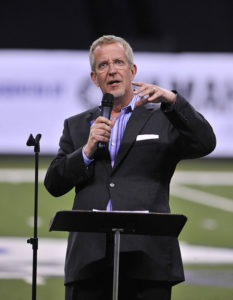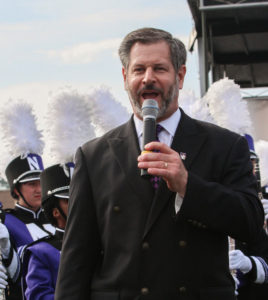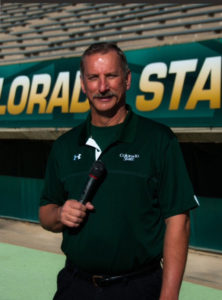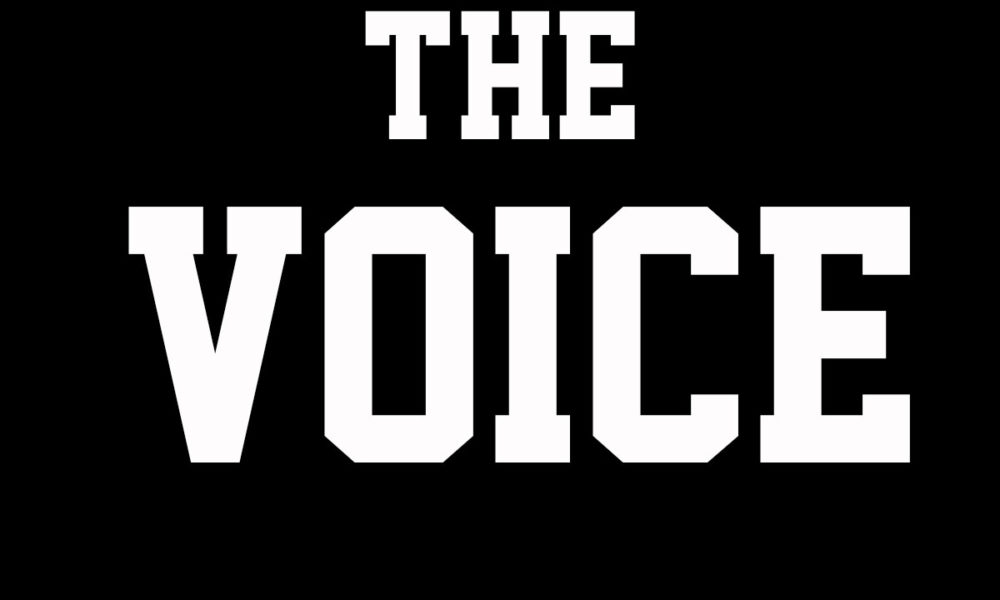Announcing for the marching arts is a labor of love.
 Dan Potter
Dan Potter
Groups: Drum Corps International and Music for All
Career: Morning News Radio Host
At a 1970s high school dance in Moline, Illinois, teens could hear a young Dan Potter through the speakers. Potter’s voice deepened early, so he started his announcing career being a DJ. “I was behind a microphone from age 14 on,” he says.
Potter, who was also drum major in his marching band, dreamed of hosting a music show on the radio. As an adult, he ended up working in news broadcasting rather than music, but he still gets to pursue music announcing through Drum Corps International (DCI) and Music for All’s Bands of America (BOA) competitions. “It seemed like a logical way to give back to marching arts … to stay involved by lending whatever talent I had,” he says.
Potter started announcing for DCI in 1990. At the time, he was an announcer for a radio station in Dallas, Texas, the city where DCI Finals would be held the following year. “I was asked to be part of the pre-event marketing team to generate some buzz,” Potter says.
Field Pass
At DCI shows, Potter has become famous for the on-field interviews he conducts with musicians and directors after their performances. “I want to put the audience in their marching shoes, so to speak,” Potter says. “I want to find out how they feel at that moment. Was their heart racing? Did they feel like it was a good show?”
Often, Potter will search for interesting interviewees ahead of time. “I go to the directors and say, ‘Did somebody overcome a hardship this year? Is there anything unusual?’” he says. “I look for an angle. Usually there is a kid with a story to tell.”
Potter also announces from the field at BOA Super Regionals. His experiences announcing for BOA have been similar to DCI with the occasional exception of the audience’s reaction. “At a BOA regional, you see there’s a pocket of really avid support for the band on the field,” he says. “That’s mom and dad; that’s where the boosters are sitting. Whereas if I’m announcing the Madison Scouts or the Bluecoats, it’s more of a general reaction from the entire crowd.”
For DCI, Potter also hosts a podcast called “Field Pass.” Episodes have reported on “This week in DCI” as well as performer profiles and season previews. “It’s fun for me because I have a lot of creative freedom in producing the podcast,” Potter says.
A Day in the Life
On the day of a DCI show, Potter will arrive to the stadium about an hour and a half before the first corps begins. He receives a prepared script though it isn’t always linear. “Information on each corps is there, and 30-second public service announcements to read between the corps are there,” he says.
After he has finished announcing all of the corps for the day, Potter will usually stay for another half hour to conduct additional interviews for “Field Pass.”
For Potter, broadcasting makes up his entire career. “My mindset when I turn on the microphone is the same as it is when I go on the field,” he says. “You’re performing to the best of your ability.”
 Chuck Henson
Chuck Henson
Group: Music for All
Career: TV Traffic Reporter for Bay News 9
In the summer of 1987, Chuck Henson, a former color guard member for the Madison Scouts, was teaching at the annual summer camp for Bands of America (then called Marching Bands of America). He did not plan on announcing at the championship show—until the announcer got sick and needed someone to fill in. “I’ve done every [BOA] show since, for the last 30 years,” Henson says.
During the past three decades, Henson has watched the evolution of BOA—now part of parent organization Music for All—and its members. “I’ve officially been doing it long enough that there are kids in the band when I started who have kids in the band now,” he says.
As the years have gone by, Henson’s motivation to keep announcing for BOA has changed but remained strong. “When I was in college, it was the money,” he says. “Now I don’t need to supplement my income. I come back because I see what the activity has become. Every kid who steps on that field feels like they’re on the top of their game. The announcer can be a part of that.”
From TV to the Press Box
When he’s not announcing for BOA, Henson is the TV traffic reporter for Bay News 9 in St. Petersburg, Florida. “Public address is a lot different than working in TV,” Henson says.
The main difference is how much improvisation he is allowed. “There are very few times when we want an announcer at a BOA show to speak off the cuff,” he says. “We like every word to be written down. We’re here to focus on the kids and make a consistent, supportive environment.”
On television, however, Henson has more room to ad-lib. “On TV, I don’t have a script,” he says. “I call police agencies; I gather instant reports; I build maps. I deliver that info from memory. It’s all off the cuff.”
A Day in the Life
On the day of a BOA show, Henson arrives around 7:30 a.m. to receive his script. The first band usually starts at 9 a.m., so Henson spends some time preparing. “I tell every announcer on the planet, ‘Don’t cold read anything!’” he says.
Part of this preparation includes making sure he knows how to pronounce every drum major’s name. If he’s unsure, he’ll use a radio to contact someone on the field to ask the drum major to pronounce it for him. “If you’re standing on the field and the announcer messes up your name, that’s not cool!” he says. “You’re not able to start the show at the level you want.”
A typical BOA competition will last until around 11 p.m. According to Henson, announcing for 14 hours in one day is tiring but rewarding. “You’re exhausted by the end of the day, and all you do is sit and read,” he says. “It’s very important to keep that focus all day long. Every 15 minutes, there’s a different set of kids, … and they’re counting on me to do my very best!”
 Pete Friedmann
Pete Friedmann
Group: Northwestern University Marching Band
Career: Speaking Consultant
Like most kids, Pete Friedmann spent his Saturday mornings playing with his friends—but he got to do it in a radio station! When Friedmann was growing up, his friend’s dad was a broadcaster for a local radio station in Scranton, Pennsylvania, and Friedmann would often tag along to the studio on Saturdays. “We took turns, one of us being the engineer, and one of us being the on-air talent,” Friedmann says. “We’d just play radio in a real radio station.”
Friedmann’s love of radio persisted through his years as a high school clarinetist and drum major. When it came time to apply to college, he looked at schools with a strong broadcasting program and a good marching band. As a result, Friedmann chose Northwestern University in Evanston, Illinois.
When the band’s announcer had to leave early for one game, Friedmann filled in for him as the post-game announcer. “He liked what I did, so the first two years after I graduated, they had me help out,” Friedmann says.
Friedmann was working as a news reporter for a radio station in Joliet, Illinois, when Northwestern’s marching band announcer moved out of state, allowing Friedmann to follow him in the position. “This year will be my 37th year,” he says.
In addition to band announcing, Friedmann does contracted voiceover work, including commercials and public service announcements. However, his primary job is to help other people get comfortable with public speaking. “People’s fears of public speaking can be addressed if you understand what’s driving that fear and [give] them strategies to deal with it,” he says.
Band and Basketball
In addition to announcing for the marching band, Friedmann has also announced for the Northwestern University Women’s Basketball team since 2012. That year, the current announcer was leaving the position, and the athletic department held an open casting call for his successor.
Dan Farris, Northwestern’s marching band director, encouraged Friedmann—who was a basketball season ticket holder—to audition for the spot. He got the job.
Friedmann has also announced three Big Ten women’s basketball tournaments. Announcing for basketball has been a rewarding challenge for Friedmann. “Instead of being a passive fan, I really have to have my head in the game,” he says.
While announcing for basketball is a new challenge, Friedmann has found the spontaneity of it to be similar to announcing for marching band, especially during the band’s pregame show. “Pregame doesn’t change a lot, but it still makes me work because I have to be alert,” he says. “You don’t just read [the script]. It’s got to fit in with the action on the field. It makes you watch, count, [and]—when there are things you can’t hear—look for visual cues.”
A Day in the Life
A day or two before each Northwestern home football game, Friedmann will receive a script for the pregame and halftime show.
On game day, Friedmann arrives at the stadium about three hours before kickoff. He uses that time to do vocal warmups and review his script. One hour before kickoff, the band will perform a concert for fans. Friedmann arrives to that concert early to have a meet-and-greet with the audience, which usually comprises Northwestern alumni and band parents. “Audiences should not be taken for granted,” he says.
After the concert, Friedmann speeds off to the press box, so that he will have time to hydrate before announcing the pregame show. “The elevators get crowded, and I cannot be late!” he says. “Sometimes I have to push through lines. I say, ‘I’m working!’”
Friedmann announces the pregame and halftime shows, then spends the second half of the game writing the script for the post-game show. During post-game, Friedmann is known for introducing each song with a rhyme or a poem that reflects the outcome of the game.
Spending almost four decades announcing for his alma mater has left Friedmann with a plethora of fun memories. “I had to do a witch [voice] for Halloween; [I had] to imitate Vincent Price at the beginning of ‘Thriller’ and do that narration,” he says. “Things that make me prepare to capture the right voice, those are very memorable.”
 Joe Bartko
Joe Bartko
Groups: Colorado State University Marching Band, Blue Knights Drum and Bugle Corps, and WGI
Career: Independent Contractor and Entrepreneur
In the band announcing world, Joe Bartko has become a jack of all trades. From announcing for the Colorado State University (CSU) Marching Band to WGI Sport of the Arts championships to Drums Along the Rockies—the home drum corps show for the Blue Knights—plus concert band gigs, Bartko has gained a variety of experiences.
“You have to have the ability to change your characteristic and how you announce,” Bartko says. “When you announce for drum corps, you have to get the crowd energized. … The indoor percussion, same thing. … In concert band festivals, it’s the opposite—you have to have a more serious timbre.”
To balance it all, Bartko makes sure to spread everything out over the course of the year. “College football starts at the end of August,” he says. “Drum corps is during the summer months. WGI is during the winter. Marching band is in the fall. It’s spread out over the course of the year.”
Unique Experiences
Bartko, a Blue Knights alum, also does radio and TV voiceover work on a freelance basis and is an entrepreneur with his own consulting business. “My number one event is being the voice of the Colorado State University Marching Band,” he says. “I was in marching band in high school. I did drum corps. But I never got to be a part of a four-year college marching band.”
Time spent with Colorado State has given Bartko some of his favorite memories. In 2013, the band took a trip to Dublin, Ireland, to perform in the St. Patrick’s Festival Parade. “That was an experience of a lifetime,” Bartko says. “They don’t have college marching bands and drum corps like we do in the United States. The crowds are very engaging, very appreciative.”
When Colorado State won the parade competition, it got an interesting prize. “As tradition has it, the mayor of Dublin pours beer on the winners,” Bartko says.
As the announcer for Drums Along the Rockies since 2001, Bartko and the Blue Knights also got to experience the unveiling of Mile High Stadium in Denver. “We were one of the very first events in that stadium before the Broncos [football team] even got in there,” he says.
A Day in the Life
A day of announcing for Colorado State takes a lot of preparation. “For me, game day starts the night before,” Bartko says.
Bartko goes to the band’s Friday-night rehearsal before a game. He receives his script and practices announcing with the band. “We have to get our timing down because of television,” he says.
On Saturday, Bartko will arrive at the stadium four to five hours before kickoff. “[I] make sure I have a mic that works,” he says. “We’ve had a few instances where we’ve had a battery issue, so I always carry extra batteries.”
Though he juggles multiple announcing personalities, Bartko knows that game day at CSU is always a time for maximum excitement. “This is a college football environment,” he says. “You’ve got all kinds of individuals there, and you have to come across as very lively, very entertaining.”


